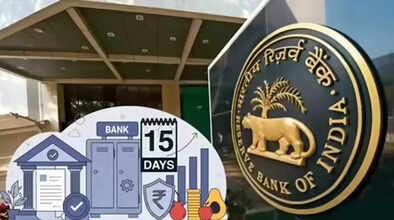RBI New Rules: Banks must settle locker and account claims within 15 days, RBI changes rules..

The Reserve Bank of India (RBI) has revised new rules for settling claims related to bank accounts and lockers of deceased customers. The primary objective of these rules is to unify the various procedures followed by banks, standardize documentation, and improve the quality of customer service. According to the new guidelines, banks must settle claims of deceased customers within 15 days of receiving all required documents. Claimants will also be compensated for any delays on the part of the bank. These rules apply to deposit accounts, safe deposit lockers, and safe deposit items. They must be fully implemented by March 31, 2026.
The RBI has made a significant change. It has taken significant steps to improve the way banks handle claims of deceased customers. On Friday, the RBI issued new directives, the "Reserve Bank of India (Settlement of Claims in Respect of Deceased Customers of Banks) Directions, 2025." The primary objective of these directives is to unify the various procedures used by banks to settle claims of deceased customers. This will bring uniformity across the banking system. These rules will also standardize documentation, simplifying the process. The ultimate goal of all these changes is to improve the quality of customer service.
Rules to be implemented by March 31, 2026
The RBI has also stated that these new rules will be implemented as soon as possible. However, banks will be required to fully implement them before March 31, 2026. These directives apply to the settlement of all types of claims related to deceased customer deposit accounts, safe deposit lockers, and safe deposit items.
The RBI has issued important clarifications regarding deposit accounts. If a deposit account holder has already nominated someone or the account was opened with a survivorship clause (i.e., upon the death of one person, the other person will become the owner of the account), the process will be straightforward. Upon the depositor's death, the remaining balance in the account will be paid to the nominee or survivor. The RBI has clearly stated that this payment by the bank to the nominee or survivor will be considered a valid settlement of the bank's liability. This means that the bank's responsibility will be discharged and it will not need to engage in any further legal proceedings. This provision significantly simplifies the process for accounts with nominees and saves claimants unnecessary hassle.
For cases where deposit accounts have no nominees or no survivorship clause, the RBI has directed banks to follow a simplified procedure. This simplified process is intended for settling claims where the total amount to be paid is below a certain threshold. This threshold limit is called the "threshold limit." The threshold limit is set at ₹5 lakh for cooperative banks. For any other bank (such as a public sector bank or private bank), the limit is ₹15 lakh.
This Limit
The RBI has also allowed banks, including cooperative banks, the flexibility to increase this threshold limit based on their convenience and internal policies. This provision will help reduce legal processes for small claims and ensure faster payment to claimants.
However, if the amount to be paid exceeds the threshold limit, i.e., ₹5 lakh for cooperative banks and ₹15 lakh for other banks, banks may request additional documents. These additional documents typically include a succession certificate or a legal heir certificate. These documents are necessary to ensure that payment is made to the correct legal heir. These latest RBI directives also outline detailed rules for settling claims that are not covered by this simplified process. This means that even large claims will have a clear and systematic process, albeit requiring additional documentation to prevent fraud.
Clear Rules for Lockers
The RBI has laid down clear rules not only for deposit accounts but also for settling claims related to deceased customers' safe deposit lockers and safe deposit items. Banks must comply with these rules. These directives outline who can claim a locker, what documents they must submit, and how the contents of the locker will be disposed of. Similarly, if a customer had kept any of his valuables in the safe custody of the bank, then how would those items be disposed of after his death?
Disclaimer: This content has been sourced and edited from Navbharat Times. While we have made modifications for clarity and presentation, the original content belongs to its respective authors and website. We do not claim ownership of the content.

